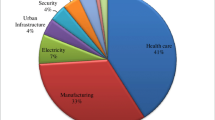Abstract
The advent of Internet of Medical Things (IoMT) has become a greater boom in the present scenario due to the pandemic COVID-19. Nowadays, remote monitoring of the patients is significant in elderly people as well as COVID-19-affected cases. It is known that the medical data is more sensitive and if not handled properly can result in adverse conditions. In this paper, a Zero Trust Model (ZTM) is introduced to handle the security of the IoMT data. This framework will definitely mitigate the occurrence if threats and further benefit the users.
Access this chapter
Tax calculation will be finalised at checkout
Purchases are for personal use only
Similar content being viewed by others
References
Rodgers MM, Pai VM, Conroy RS (2015) Recent advances in wearable sensors for health monitoring. IEEE Sens J 15(6):3119–3126
A Guide to the Internet of Things Infographic, https://intel.com/content/www/us/en/internetof-things/infographics/guide-to-iot.html
Bevish Jinila Y, Thomas J, Shan P (2020) Internet of Things enabled approach for Hygiene Monitoring in Hospitals. International conference on computer, communication and signal processing, IEEE
Sathyabama B, Bevish JY (2019) Attacks in wireless sensor networks-a research. Int J Innov Technol Exploring Eng 8(2):775–783
Rubio JE, Roman R, Lopez J (2020) Integration of a threat traceability solution in the industrial internet of things. IEEE Trans Indust Inform
Fu K, Kohno T, Lopresti D, Mynatt E, Nahrstedt K, Patel S,… Zorn B (2020). Safety, security, and privacy threats posed by accelerating trends in the internet of things
Kai K, Pang Z-B, Wang C (2013) Security and privacy mechanism for health internet of things. J China Universities of Posts Telecommun 20(2):64–68
Dwivedi AD, Srivastava G, Dhar S, Singh R(2019) A decentralized privacy-preserving healthcare Blockchain for IOT. Sensors https://doi.org/10.3390/s19020326
Fung BCM, Wang K, Fu AW-C, Pei J (2015) Anonymity for continuous data publishing. In: Proceedings 11th international conference extending database technol. Adv. Database Technol. EDBT 08, p 264
Zhou B, Han Y, Pei J, Jiang B, Tao Y, Jia Y (2009) Continuous privacy preserving publishing of data streams. Proceedings 12th international conference extending database technol. Adv. Database Technol—EDBT’09, p 648
J. Pei, J. Xu, Z. Wang, W. Wang, K. Wang, Maintaining k-anonymity against incremental updates, Ssdbm, 2007
Doka K, Tsoumakos D, Koziris N (2011) Kanis: preserving k-anonymity over distributed data. Proceedings 5th International work. Pers. Access, Profile Manag. Context Aware. Databases
Xiao X, Tao Y (2007) M-invariance: towards privacy preserving re-publication of dynamic datasets. SIGMOD Conference, pp 689–700
He Y, Barman S, Naughton JF (2011) Preventing equivalence attacks in updated, anonymized data. Proceedings international conference data engineering, pp 529–540
Author information
Authors and Affiliations
Editor information
Editors and Affiliations
Rights and permissions
Copyright information
© 2022 The Author(s), under exclusive license to Springer Nature Singapore Pte Ltd.
About this paper
Cite this paper
Bevish Jinila, Y., Prayla Shyry, S., Christy, A. (2022). A Multi-component-Based Zero Trust Model to Mitigate the Threats in Internet of Medical Things. In: Nanda, P., Verma, V.K., Srivastava, S., Gupta, R.K., Mazumdar, A.P. (eds) Data Engineering for Smart Systems. Lecture Notes in Networks and Systems, vol 238. Springer, Singapore. https://doi.org/10.1007/978-981-16-2641-8_57
Download citation
DOI: https://doi.org/10.1007/978-981-16-2641-8_57
Published:
Publisher Name: Springer, Singapore
Print ISBN: 978-981-16-2640-1
Online ISBN: 978-981-16-2641-8
eBook Packages: Intelligent Technologies and RoboticsIntelligent Technologies and Robotics (R0)




